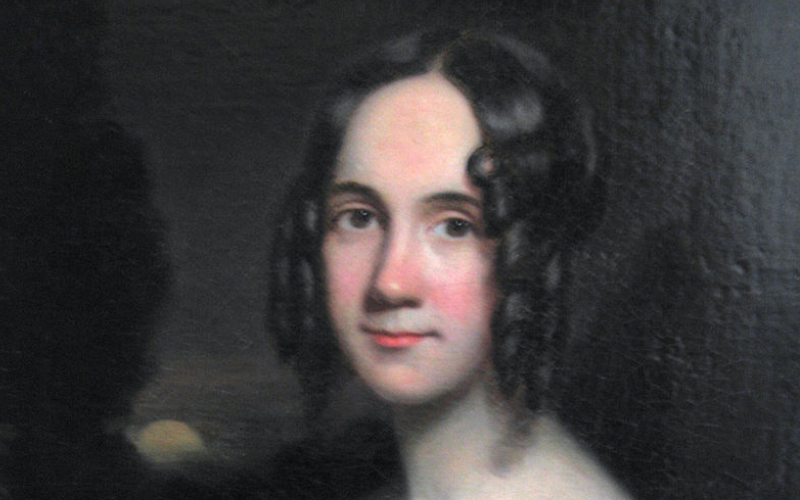Every year, Americans gather to celebrate Thanksgiving, a day synonymous with gratitude, unity, and tradition. But hidden behind the holiday’s warm glow is a forgotten figure whose tireless efforts brought this cherished holiday to life. Sarah Josepha Hale, best known for writing the nursery rhyme Mary Had a Little Lamb, holds the true key to Thanksgiving’s origins.
Could one woman’s vision and perseverance, have single-handedly shaped one of America’s most enduring traditions?
The tale of Mrs. Hale reveals how her unyielding quest transformed a divided nation and how her legacy, almost lost to history, continues to be a part of our lives today.
Sarah Josepha Hale
Born in 1788 in Newport, New Hampshire, Sarah Josepha Hale’s life was far from ordinary. Widowed at 34 with five children to raise, she turned to writing not only to survive but to make her mark on a world not yet ready to acknowledge the contributions of women.
She was the first female editor of Godey’s Lady’s Book, America’s most influential magazine of its time, Hale used her pen to shape cultural norms and challenge societal boundaries.
But beneath her celebrated editorial success lay a mission few understood or knew about. For nearly 17 years, Hale campaigned relentlessly for Thanksgiving to become a national holiday. To her, this was not merely a call for festive feasts; it was a vision of healing—a day of gratitude to bridge the growing rift between North and South as the threat of civil war loomed.
Why did a widowed mother and writer, believe so deeply in Thanksgiving’s potential? Could she have foreseen the power of her efforts to unite a nation torn apart by war?
A Quiet Campaign Begins
Hale’s mission began in the 1840s, quietly but with growing fervor. From her editorial perch, she wove Thanksgiving into the national consciousness, publishing heartfelt appeals, evocative stories, and even recipes for the holiday she envisioned. She urged governors, clergy, and prominent figures to adopt the tradition in their states.
Yet Hale was not content with regional recognition. She saw Thanksgiving as more than a patchwork celebration. Her vision was for a national holiday dedicated to gratitude, transcending politics and geography. But how could one woman, even one as influential as Hale, bring such an idea to life?
The Letter That Changed History
As the Civil War ravaged the country, Hale seized her moment. In 1863, she wrote directly to President Abraham Lincoln. Her letter, carefully composed, implored him to declare Thanksgiving a national holiday.
Hale’s words reached Lincoln at a time of profound division and despair. She argued that a day of collective gratitude could help heal the war-torn nation. On October 3, 1863, Lincoln issued a proclamation declaring the last Thursday in November a National Day of Thanksgiving. His words echoed Hale’s plea, urging Americans to give thanks amid their hardships.
Could it be that Hale’s quiet campaign, unnoticed by many, had swayed the president during one of the darkest moments in American history?
A Legacy Lost to Time
Despite her triumph, Sarah Josepha Hale’s role in creating Thanksgiving has been largely overshadowed. Instead, she is remembered for Mary Had a Little Lamb, a rhyme that pales in comparison to her cultural contributions. Why would history obscure the woman whose vision helped bring unity to a divided nation?
Hale’s story, like the holiday she championed, holds lessons for modern times. Her determination reminds us that even in the face of great division, a single voice can inspire change. Her campaign for Thanksgiving reveals how small acts of gratitude can ripple outward, transforming not just individuals but an entire country.
The Mystery of Sarah Josepha Hale
Why did Hale dedicate nearly two decades of her life to this cause? Was it a response to the growing discord she sensed in the nation, or was it something more personal, rooted in her own trials and loss? The answers remain elusive, buried in the annals of history, but her legacy endures in the holiday we celebrate today.
A Day of Gratitude, A Testament to Unity
This Thanksgiving weekend, as families gather together, they unknowingly honor the work of Sarah Josepha Hale—a woman who bridged divides and created a tradition rooted in gratitude. Her story, though almost forgotten, reminds us of the power of perseverance and the enduring impact of a single vision.
As we share meals and create new memories, we recognize the woman who gave us this holiday and the other mysteries of history that continue to shape our lives.





 “Yesteryear’s Ruin” captures the essence of human resilience in the face of unimaginable loss. Through a narrative that weaves together love, despair, and the quest for redemption, this historical psychological thriller invites readers into a world where the past is not merely a memory, but a realm that may hold the key to our deepest desires and darkest fears.
“Yesteryear’s Ruin” captures the essence of human resilience in the face of unimaginable loss. Through a narrative that weaves together love, despair, and the quest for redemption, this historical psychological thriller invites readers into a world where the past is not merely a memory, but a realm that may hold the key to our deepest desires and darkest fears.